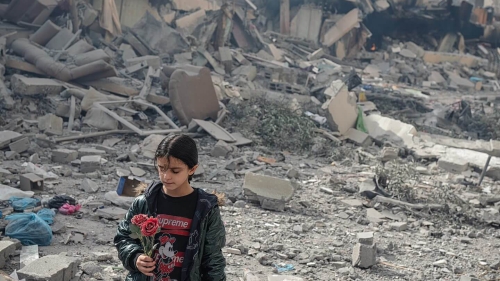A report from New York on the UN conference on globalization
NEW YORK, Sept 17 (iviews.com) - The 52nd annual Department of Public Information (DPI) and Non Governmental Organization (NGO) conference, held September 15-17 at the United Nations building in New York, focused on world-wide concern over the effects of globalization. In his opening address to representatives of the over 800 NGOs gathered at the conference, UN Secretary General Kofi Annan stressed the need for a more human face to globalization, a face whose creation necessitated the involvement of non-governmental partners and civil society at large.
Jordan's Queen Noor al-Hussein followed Annan in Wednesday's opening and said there needed to be a balance between concern for profits and concern for people. She said NGOs, together with government and business, should be part of the three-pronged plug through which the power of globalization could flow.
Nobel laureate and former Costa Rican president, Oscar Arias, condemned the tremendous wealth gap of the present times and said that local communities, instead of an elite few, must be empowered to decide the form globalization would take in their areas.
But despite any agreement on the need to humanize globalization, the variety of sessions that followed the opening remarks revealed differing opinions on the actual gravity of the situation and the best way to counteract some of the admittedly harmful effects of globalization and free markets. John Hancock, a counselor for the World Trade Organization (WTO), speaking at a panel discussion on globalization held Wednesday afternoon, said it was not up to the WTO to impose regulations on business and blamed many humanitarian problems on "internal issues." As an example, Hancock noted the problem of hormone treated beef, which came into use as a result of consumer demand rather than a trade issue.
Paribas' Chief Economist for North America, Brian Fabri, said he did not think the situation was so alarming. Fabri faulted high-level corruption, a lack of transparency and dishonest legal systems and urged countries to embrace pro-market policies. "It is better to have had capital and lost, than to never have had capital at all," he said.
Speaking at a September 16 session addressing globalization's effect on labor, US Deputy Under Secretary of Internal Labor Affairs, Andrew Samet, agreed that there is need to protect workers from the volatile nature of globalization. But he also stressed the need for internal action in the form of increased social safety nets rather than global policies. He said, "It is not mutually exclusive to have trade and human rights," and that humanizing globalization was "not about restricting global commerce."
But a session held early Thursday morning, examining the way tobacco companies have manipulated the opportunities provided by globalization to circumvent humanitarian concerns, provided a moving case study into the not-always altruistic intentions of big business and its ability to undermine the best efforts of government and civil society alike. Derek Yach, director of the Tobacco Free Initiative, said big business interests such as tobacco companies were capable of "distorting our knowledge" and "subverting administrative and legislative structures around the world" on both the civil society and governmental level.
Craig Kielberger, the 16 year-old chairperson of the Free the Children, received a standing ovation at Thursday's conference on labor for his stirring denunciation of the greed and waste of many companies which was responsible for the enslavement, brutalization and murder of children around the world.
Closing Thursday's session on labor, Martha Ojeda, a Mexican labor activist, likewise received a standing ovation when she directly condemned big business and the global policies that allowed it to exploit poor workers. She said that the policies amounted to a "slavery of neo-liberalism" and that for millions of poor workers the so-called benefits of globalization do not reach them. She related horrifying accounts of big business exploitation of worker's rights that included imprisonment, beatings, uncompensated injuries, rape and sexual molestation. She said that everywhere there is "misery and famine" and that the UN "must guarantee the rights of the workers."
The conference reopened Friday morning with sessions examining communications technology and creating partnerships between civil society, the private sector and government.

















